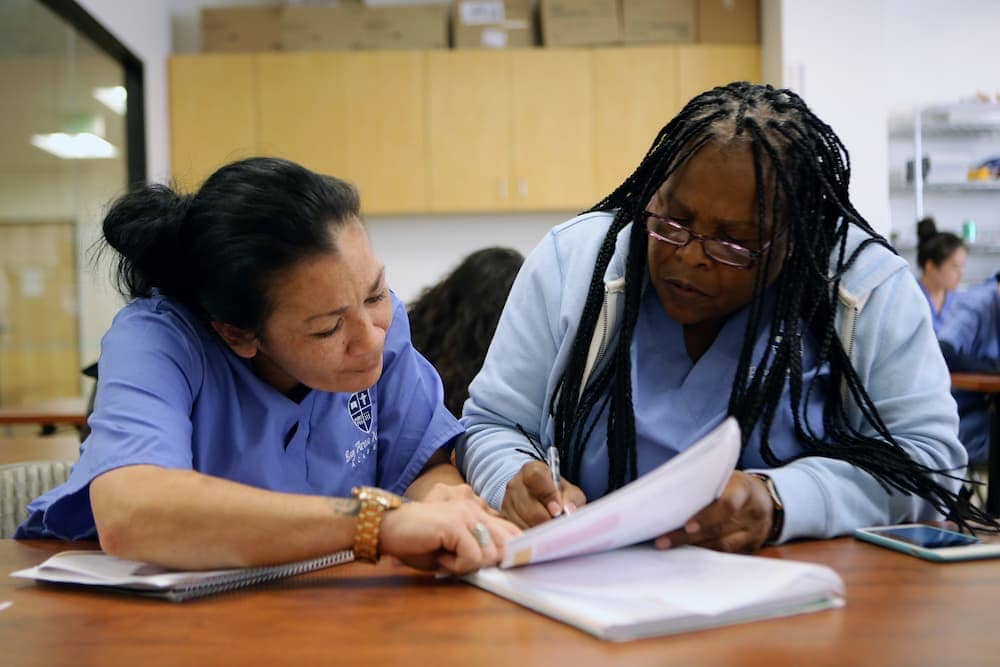We offer Medical Assisting classes year-round, so you can start when it’s convenient for you. Learn more about our program today!
Class Calendar | Call admissions on 415-943-2028
Find Phlebotomy Technician and EKG Technician training at BAMA Institute
Class Calendar | Call admissions on 415-943-2028

As a medical assistant, your skills can transfer to a wide range of career paths. Whether you are looking to work in a laboratory, focus on patient care, or specialize in the administrative side of medicine, the right MA program prepares you for the future you want. So, what other jobs can a medical assistant apply for? With the right training, the opportunities are virtually endless.
What other jobs a medical assistant qualifies for depends largely on the specific training program you complete and the certifications you achieve. A comprehensive program, like Bay Area Medical Academy’s 3-in-1 Medical Assistant with Phlebotomy training, maximizes your opportunities by giving you a diverse and in-demand skill set.
The BAMA program prepares you for three certifications:
These certifications open up three general paths to new opportunities. On some of these paths, advancement is possible through on-the-job experience alone. Others will require additional training.

An MA program opens up all the positions in the administrative/operational segment through on-the-job training. Many healthcare employers in the Bay Area use a ladder model for their medical assistance career progression. For example, at Stanford Health Care, you can progress through the following levels:
As an MA progresses through the levels, they gain skills that they can use to take on positions of higher responsibility—and higher pay.
With BAMA’s program, students are also prepared to progress through the positions on the lab and imaging side. MAs who go on to specialize in phlebotomy can demand a much higher starting pay than a phlebotomist with no MA experience.
Some career paths, however, require additional education. Licensed Vocational Nurses (LVN) and Registered Nurses (RN), for example, must complete dedicated training programs, though MA clinical hours are typically transferrable.
Specializing is one of the best ways for medical assistants to make their careers more personally fulfilling and financially rewarding. With specialties, you can work in something you’re truly passionate about while gaining niche skills. Here are some of the common specialties to consider:
Just about every medical specialty you can think of needs MAs. There may even be a few you haven’t thought of. Take, for example, hair transplant clinics. One of the newest methods of treating male pattern baldness is via platelet-rich plasma injections. This involves taking blood from patients, preparing it, and using it in injections to trigger hair growth. The process is highly specialized, but a confident medical assistant is well-suited for the role. That gives them a rare skill that will help boost their career opportunities.
Specialization comes from on-the-job training you obtain while you work in the position. Someone with a strong MA background will be able to segue their skills into one of these areas and grow from there.
What other jobs can a medical assistant apply for? If you choose the right training program, the possibilities are boundless. Whether you want to take on a leadership role in the administrative side of medicine, work in a laboratory, focus on imaging, or specialize in an area of medicine close to your heart, a comprehensive MA program can help you start your journey.
Bay Area Medical Academy training opens the door to many of the jobs medical assistants can apply for. To learn more, contact an admissions representative.
"*" indicates required fields
Our career-oriented program gives you hands-on, real-world training and ongoing support for your long-term goals.
For more information on BAMA's medical assisting and phlebotomy degree programs, contact us today!
BAMA: The Bay Area's best career-oriented healthcare traning
© 2024 Bay Area Medical Academy. All Rights Reserved. Website by WindsAndWater